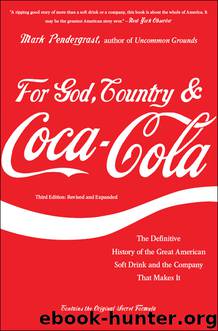For God, Country, and Coca-Cola by Mark Pendergrast

Author:Mark Pendergrast [Pendergrast, Mark]
Language: eng
Format: epub, mobi
ISBN: 9780465046997
Publisher: Basic Books
THE ARAB BOYCOTT BLUES
That same year, Paul Austin convinced Woodruff that things could go better for Coke behind the Iron Curtain as well as in the drive-ins and skating rinks of America. The Bulgarian government signed on as a Coca-Cola bottler, importing concentrate from the Company, since the local imitation, Bulgar Cola, failed to find a market. Romania, Czechoslovakia, and Yugoslavia soon followed suit.
Austin initiated contacts with the Soviet government, but he was afraid that selling Coke in the USSR might prompt an American backlash. Testing the waters, he dispatched Boisfeuillet Jones, who now worked for Robert Woodruff’s philanthropic endeavors, to meet secretly with Averell Harriman, LBJ’s Ambassador at Large, in Washington. When Jones asked whether the State Department would object to the sale of Coca-Cola in Russia, Harriman responded that the venture would be “in the national interest.” After a favorable consensus from other advisers—even cold warrior Jim Farley approved, writing that if Coca-Cola didn’t “get in there,” Pepsi undoubtedly would—Austin sent Alex Makinsky and another Russian-speaking Coke man to the Kremlin to work out the details. Coca-Cola would be bottled in Moscow for sale only to outlets operated by Intourist, the Russian travel bureau, as part of an overall Soviet plan to attract foreign money. When word leaked of the impending deal, however, the Company received negative press. The profits from Russian Coke, one paper complained, would “help the Kremlin’s pals—in Red China and Viet Nam—pals whose troops and Viet Cong puppets are killing, wounding and capturing good U.S. fighting men.” Concluding that Americans probably weren’t yet prepared for a rapprochement with the Communists, Austin—possibly at Woodruff’s behest—postponed the project.
In 1966, despite Austin’s best efforts, Coca-Cola became a hot political topic anyway. The Company refused to grant a franchise to an Israeli bottler, and the Anti-Defamation League accused Coca-Cola of compliance with the Arab League boycott of Israel. Within a week, the American Jewish community was calling for a boycott of its own. Manhattan’s Mount Sinai Hospital stopped serving Coke in its cafeteria, and Nathan’s Famous Hot Dog emporium on Coney Island threatened to turn off the spigot as well. Offended Jews threw Coke coolers out of second-story windows in Chicago and Los Angeles. Coca-Cola had to act quickly if it didn’t want to lose the lucrative American Jewish market. James Farley defended the Company by pointing out that Coca-Cola had attempted to enter Israel back in 1949 but had been denied because of rampant anti-American feeling. Furthermore, market research had revealed that conditions in Israel weren’t conducive to profitable sales. No one bought Farley’s explanations, and boycott plans progressed.
Swiftly, The Coca-Cola Company moved to find a bottler, announcing within days that New York banker Abraham Feinberg, one of the original applicants back in 1949, was interested in funding an Israeli franchise, and the Company had signed a letter of intent with him. The hubbub in the United States died down, but the war drums began beating in the Arab countries, where Coca-Cola sold a hundred thousand cases a year through thirty locally owned bottling plants.
Download
For God, Country, and Coca-Cola by Mark Pendergrast.mobi
This site does not store any files on its server. We only index and link to content provided by other sites. Please contact the content providers to delete copyright contents if any and email us, we'll remove relevant links or contents immediately.
Life 3.0: Being Human in the Age of Artificial Intelligence by Tegmark Max(5545)
The Sports Rules Book by Human Kinetics(4379)
The Age of Surveillance Capitalism by Shoshana Zuboff(4274)
ACT Math For Dummies by Zegarelli Mark(4043)
Unlabel: Selling You Without Selling Out by Marc Ecko(3658)
Blood, Sweat, and Pixels by Jason Schreier(3611)
Hidden Persuasion: 33 psychological influence techniques in advertising by Marc Andrews & Matthijs van Leeuwen & Rick van Baaren(3551)
The Pixar Touch by David A. Price(3430)
Bad Pharma by Ben Goldacre(3420)
Urban Outlaw by Magnus Walker(3392)
Project Animal Farm: An Accidental Journey into the Secret World of Farming and the Truth About Our Food by Sonia Faruqi(3212)
Kitchen confidential by Anthony Bourdain(3079)
Brotopia by Emily Chang(3047)
Slugfest by Reed Tucker(2997)
The Content Trap by Bharat Anand(2916)
The Airbnb Story by Leigh Gallagher(2851)
Coffee for One by KJ Fallon(2629)
Smuggler's Cove: Exotic Cocktails, Rum, and the Cult of Tiki by Martin Cate & Rebecca Cate(2518)
Beer is proof God loves us by Charles W. Bamforth(2452)
